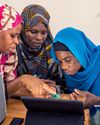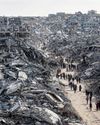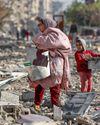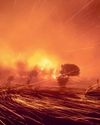
"I did it as quietly as I could," said Vice Adm Eduardo Santos, who was chief of the navy at the time. His plan had been to run the ship on to a small reef known as Second Thomas Shoal, one of the world's most fiercely contested maritime sites, without China knowing. The move would help the Philippines defend the area for decades to come.
"The first reaction was the Chinese ambassador knocking at my office early in the morning when they heard about it... I said, 'Well, it was supposed to be on the way [to a mission], and it ran aground," said Santos. With hindsight, Santos, who is now 80, can smile, though he is keenly aware of how delicate the issue remains.
If the shoal had been left unoccupied, it would have been lost to Beijing, he said, because the Philippines was already facing a "creeping invasion" by China. Beijing had seized Mischief Reef, an atoll just 21 nautical miles (39km) away, despite being within the Philippines' exclusive economic zone (EEZ) - an area that stretches 200 nautical miles from a state's coast, giving it special rights to build or exploit resources in the area. Second Thomas Shoal is also with the Philippines' EEZ.
The Sierra Madre's last journey was a crucial milestone in the wider dispute over the South China Sea, a region that hosts one of the world's busiest trade routes, and is thought to be rich in oil and gas deposits.
This story is from the August 02, 2024 edition of The Guardian Weekly.
Start your 7-day Magzter GOLD free trial to access thousands of curated premium stories, and 9,000+ magazines and newspapers.
Already a subscriber ? Sign In
This story is from the August 02, 2024 edition of The Guardian Weekly.
Start your 7-day Magzter GOLD free trial to access thousands of curated premium stories, and 9,000+ magazines and newspapers.
Already a subscriber? Sign In

Power play The Solar Mamas who are lighting up Zanzibar
In a dimly lit corridor of a mudwalled house nestled among coconut trees, Sharifa Hussein stripped red and black cables, a screwdriver voltage tester balanced between her lips and rolls of cable lying by her feet.

Play it again and again
Spotify's Billions Club tracks the world's most popular songs, but many greats are nowhere to be found. What are the forces shaping pop's new canon?

David Lynch 1946 -2025
The maverick American surrealist film director sustained a successful mainstream career while also probing the bizarre, the radical and the experimental

Election fever grows ....but Trump is pulling the strings
The machinations of Elon Musk andthe returning US president loom large in minds of politicians and voters

International response America's allies hope for the best-but prepare for the worst
Western allies of the US are braced for the return of Donald Trump, still hoping for the best, but largely unprepared for what may prove to be a chaotic and disorientating worst.

Mood music
Listening to, or playing, the right song can soothe pain, lift depression and help treat conditions as diverse as Parkinson's, Alzheimer's, PTSD and back pain. Neuroscientist and bestselling author Daniel Levitin gives his musical recommendations for better health, drawing on his experience of helping his friend, the legendary songwriter Joni Mitchell.

Gaza's devastation The terrible price exacted by Israel for 7 October attack
Israel began bombing Gaza on 7 October 2023 after Hamas crossed the border, killed about 1,200 people and took 251 others hostage to Gaza.
North Koreans' capture sheds new light on war
The news was sensational.

Fragile truce An agreement is in place-if it will hold matter is another
The hours-long delay in implementing the Gaza ceasefire agreement last Sunday was not a good omen for a deal that many fear could be doomed to failure as it moves through its challenging three phases.

Why did LA's wildfires explode out of control?
Acombustible combination of factors laid the groundwork for disaster as the city struggled with catastrophic blazes